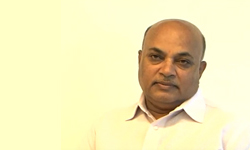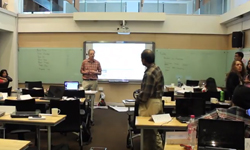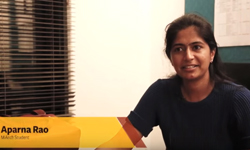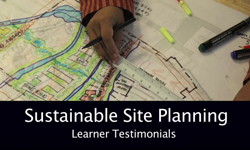Understanding Vulnerability: Concepts, Methods, and Applications for Development Planning
10-12 December 2015 | IIHS Bengaluru City Campus
This 3-day workshop on Understanding Vulnerability critically examined the different conceptualisations of vulnerability; covered the methodologies used to assess vulnerability; and used cited different cases to demonstrate application of vulnerability assessments in development planning and prioritisation. The course specially focused on vulnerability to climate change and aid better decision-making at multiple scales. Using a mix of lectures, multimedia tools, case studies from rural and urban landscapes, and participatory exercises, the workshop expanded the learner’s theoretical and methodological understanding of vulnerability.
The course was conducted as part of CARIAA-ASSAR research dissemination.
Green Interiors: Environmental Aspects of Interior Design
21 November 2015 | IIHS Bengaluru City Campus
This short course explored green concepts for interior design including material selection, interior lighting, daylighting, glass and finishes. The course covered fundamentals and technical terminologies of environmental aspects as applicable during design, construction and occupancy stages per LEED Commercial Interiors (CI) rating system. Participants understood the impact of design decisions on indoor environmental quality, energy and water savings. At the end of the course, participants were able to develop best practice green guidelines for interior design projects. This highly interactive and hands-on course aimed to bridge the gap between theory and practice.
Are Cities from the Global South adapting to climate change?
19 November 2015 | IIHS Bengaluru City Campus
Working Group II’s contribution to the Fifth Assessment Report of the Intergovernmental Panel for Climate Change (IPCC) released in November 2014, included for the first time, a review of urban areas (Chapter 8) and rural areas (Chapter 9). This was in recognition of the fact that in addition to natural and managed resources and systems such as freshwater, oceans and food production systems, human settlements and the economic sector are also directly exposed to climate change impacts and will need to adapt across different scales.
In this master class, adaptation research and practice from 4 Southern Cities (Durban and Cape Town in South Africa, Dar es Salaam in Zanzibar and Mexico City) using a city systems framework was discussed. Learners discussed this framework vis a vis Bengaluru and reflect upon the merits and challenges of applying such a frame to motivate climate adaptation in Indian cities.
Planning for Advocacy
6-7 November 2015 | IIHS Bengaluru City Campus
This two-day bilingual workshop brought together housing rights advocates from a number of cities across India to strengthen their collective capacities in urban planning. Core areas focused on the technical aspects of the Master Plan as well as other planning and governance tools that shape urban development in our cities. The workshop enabled participants to develop a campaign strategy for their city, using and applying the knowledge they gained over the two days.
Data Visualisation
29-31 October 2015 | IIHS Bengaluru City Campus
This comprehensive programme highlighted the importance of using data in the context of the development sector. Through this programme, researchers and practitioners at various levels were trained to build and share narratives around their data, using a structured process. The course familiarised learners with human-centric theoretical frameworks as well as contemporary tools in data analysis and visualisation, with a diverse set of cases and examples. At the end of the course, learners were equipped to work with spatial, quantitative and qualitative data to create simple, comprehensible and compelling narratives.
Working with Digital Maps – a course on Geospatial Technology (GIS)
8-10 October 2015 | IIHS Bengaluru City Campus
This 3 day course aimed to equip participants with application-oriented knowledge of GIS in data collection, creation, and analysis to web presentation. It introduced the various components of GIS, its relevance to spatial data and how to implement it in the participant’s field of work. This was an application oriented course designed to introduce geospatial technology to professionals, Government officials and students. The course aimed to provide an understanding of Geospatial Technology and its applications, equip participants with a hands-on understanding of GIS software (QGIS) and the use of GPS hand-held devices, educate on the potential use of GIS technology for data creation, analysis, visualisation and sharing, and sensitise participants to the use of GIS in their field of work for better decision making.
What can Southern Cities learn from each other when planning for climate change?
23 September 2015 | IIHS Bengaluru City Campus
In this class, administrative structures and planning instruments at municipal level in South Africa were discussed along with lessons for Indian Cities to tackle the interlinked challenges of urban development and climate change adaptation. The focus was on municipal structures and processes in Durban and Cape Town in South Africa, and on Bengaluru and Surat in India.
Urban Sanitation
21-23 September 2015 | IIHS Bengaluru City Campus
The three-day programme on Urban Sanitation catered to officers in the urban water and sanitation sector, working in Utilities, Urban Local Bodies, and other State Departments. This course enhanced participants’ understanding of urban sanitation systems, and enabled them to play a key role in planning, implementation, maintenance to become proficient in managing the complete wastewater cycle. The course covered both sewerage and on-site systems, and treatment systems. The course also helped participants get better acquainted with policies and programmes in urban sanitation. Finally, participants practiced how to prepare comprehensive proposals in urban sanitation.
An Introduction to Urban Studies
18 September 2015 | The Attic, New Delhi
This Masterclass introduced the questions that define the field of urban studies to those new to it. It mapped the terrain to understand the study of urban, the different disciplines involved and the problem space of “urban theory”. The class considered the inclusion of learners from multidisciplinary backgrounds, practice domains, and interests and help them find a suitable place in urban studies.
Urban Rental Housing
13 August 2015 | IIHS Bengaluru City Campus
This masterclass on rental housing attempted to unbundle questions regarding demand for rental housing, relationships between landlords and tenants and rental housing in low income households and settlements, and highlighted some of the advantages of and inequities in the rental housing market. While there is official data available on the state of the rental housing market, the masterclass opened discussions around them in order to better grasp the layers of meaning behind this data. The masterclass also covered a range of Indian and international policies and programmes on housing and rental housing in particular – identifying key features and their impacts and outcomes. In focus was India’s recent and current programmes on urban housing at the central government level, such as the Rajiv Awas Yojana, the Pradhan Mantri Awas Yojana (Housing for All 2022), and other state government schemes.
Planning Indian Cities: Utilities and the Futilities of the Master Plan
12- 14 August 2015 | IIHS Bengaluru City Campus
Cities and urban areas in India are planned by an assorted selection of accumulated practices arrived through colonialism, international consultants, bureaucracy, development agencies, and planning schools. One of the key instruments among these practices is the Master Plan (or the Development Plan) the main statutory instrument that has been at the receiving end of wide range critique during the past three decades or more. This 3-day workshop on Challenges for Planning and Planning Challenges in India critically and productively engaged the Master Plan within the planning process to examine its challenges, potentials and possibilities. This was contextualised using the major transformations in planning theory and practice across the world. Many Indian and international case studies were part of this intense, experiential and case-based learning program.
Are Southern Cities adapting to Climate Change?
7 August 2015 | IIHS Bengaluru City Campus
Working Group II’s contribution to the Fifth Assessment Report of the IPCC (Intergovernmental Panel for Climate Change) released in November 2014, included for the first time, a review of urban areas (Chapter 8) and rural areas (Chapter 9). This was in recognition of the fact that in addition to natural and managed resources and systems such as freshwater, oceans and food production systems, human settlements and the economic sector are also directly exposed to climate change impacts and will need to adapt across different scales.
In this master class, adaptation research and practice from 4 Southern Cities (Durban and Cape Town in South Africa, Dar es Salaam in Zanzibar and Mexico City) using a city systems framework was discussed. Learners were encouraged to extend this framework to Bengaluru and reflect upon the merits and challenges of applying such a frame to motivate climate adaptation in Indian cities.
Systems Thinking and Urban Public Health Management – The case of Surat
28 July 2015 | IIHS Bengaluru City Campus
This Master Class distinguished systems thinking and its application in urban service delivery, urban public health in particular. It helped identify operational, situational and cultural enablers of such collaborations in the case of Surat. Understanding these enablers had significant policy relevance to help design ‘systemic interventions’ that nurture multi-stakeholder collaboration towards creating safer and healthier cities. Key learning outcomes included the distinction between Analytical Thinking and Systems Thinking, the role of Systems Thinking in Urban Public Health Management, understanding how Municipal Corporations could enhance service delivery through collaboration, and the enablers of multi-stakeholder collaboration in the case of Surat.
Urban Transport – Introduction to Planning Efficient City Bus Systems
7-8 July 2015 | IIHS Bengaluru City Campus
This 2 day course provided participants with an in-depth understanding of critical aspects of bus-based public transport systems namely, bus network planning, costs, revenue and bus fare structuring. At the end of the course, participants were better acquainted with the public transport scenario in India and its issues. They also had a better understanding of the data requirements and types of surveys to be conducted. Additionally, the course helped develop skills to identify city bus routes and plan networks. The course focused on costs, revenue and fare fixation. From the sessions on the second day, participants understood the basic approach to cost recovery, appreciated the concepts of fare discrimination and applied the techniques of fare revision without adversely impacting commuter base. During the course, participants were encouraged to implement the learning in their cities.
Working with Digital Maps – a course on Geospatial Technology (GIS)
1-3 July 2015 | IIHS Bengaluru City Campus
This 3 day course aimed to equip participants with application-oriented knowledge of GIS in data collection, creation, and analysis to web presentation. It introduced the various components of GIS, its relevance to spatial data and its implementation in the participant’s field of work. This was an application oriented course designed to introduce geospatial technology to professionals, Government officials and students. The course aimed to provide an understanding of Geospatial Technology and its applications, equip participants with a hands-on understanding of GIS software (QGIS) and the use of GPS hand-held devices, educate on the potential use of GIS technology for data creation, analysis, visualisation and sharing, and sensitise participants to the use of GIS in their field of work for better decision making.
Scaffolds, Layouts and Palimpsests: Comics and the Urban Imagination
19-21 June 2015 | IIHS Bengaluru City Campus
This course examined the intersection between comics and the imagination of the city both in terms of representation and also how architectural concepts may offer a new way of understanding the formal properties of comics. The course introduced participants to a range of international and Indian comics via the tropes of architecture, dystopia and labyrinths.
The course was divided into 9 sessions and covered the following topics:
| DAY 1 |
DAY 2 |
DAY 3 |
| Introduction to the course |
City and architecture |
City as labyrinth |
| Thinking through comic Form |
Allegorical cities |
City, realism and reportage |
| Archives of urban experience |
City as dystopia in Manga |
Drawing the postcolonial city |
Safe Access around Transit in Indian cities
19 June 2015 | IIHS Bengaluru City Campus
This interactive session was based on the recently released WRI | EMBARQ India publication the “Safe Access Manual: Safe access to mass transit stations in Indian cities”.
Over this master class, the learners discussed the concepts of accessibility to mass transit systems and its implementation in Indian cities. The first half of the session discussed the complexity inherent in introducing such systems within the existing framework of urban transport. The second half of the session used the case of Yeshwantpur in order to discuss the fragmented and contested nature of policy implementation.
The session engaged and informed participants about the various processes involved in the planning, developing, implementing and enforcing safe access to and around mass transit stations. Participants in groups explored the challenges involved in developing a safe access plan for a station area through a role-playing game. The principles and processes of accessibility and integration of transport modes were then discussed within the context of Yeshwantpur.
SEMINAR: Power to the People? A study of Bengaluru’s Urban Taskforces
12 June 2015 | IIHS Bengaluru City Campus
This talk focused on coalitions in Bengaluru, Karnataka in the form of task forces that were set up by consecutive state governments to advise on urban policy, viz. the Bengaluru Agenda Task Force (BATF) in 1999, that has since been dissolved, and the Agenda for Bengaluru Infrastructure Development (ABIDe) in 2008.
Workshop on Writing for Digital Media
5-6 June 2015 | IIHS Bengaluru City Campus
This course focused on writing for different electronic platforms such as Social Media, Blogs (personal blogs, institutional blogs), and Op-eds. It explored how learners could leverage the strengths of these platforms while also moving past the limitations of each. It helped learners understand the nuances of each type of platform, and how to tailor their writing skills to write across these different registers considering the growing importance of the electronic writing space.
Pieces written in this course were featured at the proposed Sample media spaces for each type of e-writing:
Social Media: Facebook and Twitter
Blog: delhiwala.com
Opinion spaces: Scroll, Firstpost, Huffington post, Ladiesfinger, DailyO
The course was broken up into four sections: Social Media, Blogging (institutional and personal), and Op-Ed writing. The course was conducted through a mix of discussions and hands-on exercises. A critical review of examples was taken from existing online content to understand whether the platform was used effectively or not. The results of the exercises were shared in the class and peer-reviewed.
Unpacking Urbanism Master Class on ‘Is there a “Southern Urbanism”?’
22 May 2015 and 16 March 2015
The “southern turn” in urban studies has challenged the canon of “urban theory,” arguing that cities of the south – from Sao Paulo to Shanghai, Mombasa to Mumbai – lie unexplained by theories written in Chicago, New York and Paris. Theorising from these cities, a range of authors have begun to argue for a “southern urbanism.” This Master Class explored some of the key conceptual interventions that underlie this challenge, introducing learners to the debate and encouraging them to see what it means to theorise the urban from “here.”
Course on Urbanisation in India
6-7 May 2015
IIHS conducted a course on Urbanisation in India as part of the 10th Mid Career Training Programme Phase IV for IAS Officers at the Lal Bahadur Shastri National Academy of Administration, Mussoorie on the 6th and 7th of May, 2015. Sessions were conducted on the Indian urban opportunity, providing the basis of services in urban areas, affordable housing, urban governance, urban finance and integrated planning. The sessions were team taught by IIHS faculty and senior IAS officers using relevant Indian and international cases. 63 IAS officers were in this batch. IIHS faculty also conducted three sessions on Urban Poverty for the IAS Professional Course Phase-I (2014 Batch). There were 183 officers in this batch, and the material developed as part of the Re-Framing Urban Inclusion project was used in the training.
Facade Design Optimisation – Using eQuest for Energy Simulations
25 April 2015
Energy and daylight Simulation techniques can be used to make informed design decisions and optimise building energy performance. This course covered the tools and techniques required to conduct energy simulations for optimising the Facade Design using the software tool – eQUEST. Impact of design parameters such as location, orientation, massing, shading elements, wall and insulation selection, glass area and daylighting on whole building energy use were discussed using the simulation results.
Unpacking Urbanism Course on Unpacking ‘Place’
11-12 April 2015
What exactly is ‘place’ – say a neighbourhood in a city? How does one know its boundaries? Have boundaries vanished in a world where everything is interconnected through data flows? What lies beneath and between layers of history that make up the place? How do these layers change over time? Are places immutable? Can they change randomly? What laws govern this change? This intensive two day workshop gave learners two tools – maps and stories – to enter, read, understand and unpack a place in a city. The specific neighbourhood chosen for the course was Bholakpur, a historic neighbourhood in Hyderabad which has emerged as a scrap market over the last 25 years. In exploring Bholakpur through maps and stories, learners addressed three thematics – land, labour and waste.
Seminar : Corporate Environmental Sustainability
10 April 2015
This seminar provided a science-based view on corporate environmental sustainability, resourced from the speaker’s doctoral thesis where she interrogated a business’ ambition to become carbon neutral from a social-ecological systems frame.The speaker interrogated whether sustainability practices reflect the complex ways in which businesses are embedded in their geographical locations and regional economies. CSR Reporting indices were discussed, with a view to reveal the gaps that exist when capturing individual behaviour and leadership through primarily accounting techniques. The seminar encouraged attendees to reflect on ways in which businesses can take corporate environmental sustainability beyond business boundaries.
Unpacking Urbanism Master Class on Competitive Cities : Imaginations and Economics of Land and Real Estate
18 March 2015
Cities often act as critical sites that shape policies, discourses and aspirations that have regional, national, even global relevance and need to be examined as such. This seminar-style master class explored the idea of cities as competitive and strategic entities and focus on the importance that land and real estate have assumed in competitive urban dynamics in the Indian context. Urban land has become an important tool for negotiating with and attracting investment interest. Such land-based strategies affect the structure of the urban economy and restructure urban space. Real estate industry growth and peri urban parallel cities are some of the more visible outcomes. The class discussed the significance of urban land and real estate in terms of the national economy structure, its growth, the strategic importance that knowledge economy sectors have assumed and ultimately how land, labour and capital, the three fundamental economic building blocks, relate to one another, within the urban economy.
Unpacking Urbanism Course on Geographies of Desire : Understanding the Urban Through Film
13 – 15 March 2015
This course looked at the world of desire through films, as a way of understanding the urban. The many kinds of urban narratives present in films were looked at – not only their stories, but the many tiny narratives of desire and emotion inside these stories that tell us something about life in the city. Taking off from these insights about cinema/cinematic storytelling desire and the urban, through the course, the participants created multi-media narratives of our own with stills, video clips, basic graphics and text using mobile phones and computers.
Unpacking Urbanism Master Class on Three Cities, Three Dharmas
20 February 2015
We tend to think of the Ramayana as the story of a forest exile, a trying period of tribulation and loss in a place where marauding rakshasas and rakshasis hold sway, where magical deer dance dangerously beneath the trees, where monkeys fly and speak fluent Sanskrit. But the story of Rama, our exiled prince, is studded with cities, three of them, in fact: Ayodhya, Kishkindha and Lanka, inhabited by humans, monkeys and rakshasas, respectively. It is because the cities exist that life in the forest and the forest itself, is thrown into relief. Because each of the cities is home to a different kind of being, each of them embodies and imposes a different kind of dharma upon its citizens, particularly its women. Each city persuades its people to behave in certain ways and in each of them, the dharma that the city holds within itself is pushed, pulled, challenged and eventually, transgressed. The cities of the Ramayana give us the opportunity to examine the way dharma is created, upheld and broken within the text. They are both a physical and a metaphorical location in which we can explore ideas of right and wrong, personal and public, male and female.
Unpacking Urbanism Master Class on Randomised Evaluations in Public Policy
19 February 2015
This class introduced participants to the concept of randomised evaluation, the kind of question it seeks to address and the ethical issues in carrying out these experiments. Participants were exposed to the methods which are being increasingly used to address important questions of public policy in developing countries.







